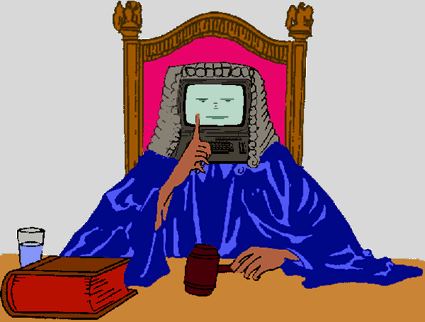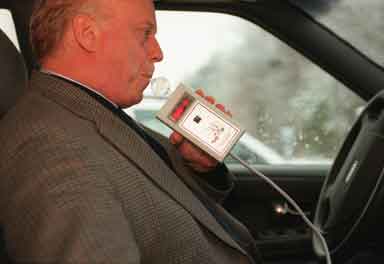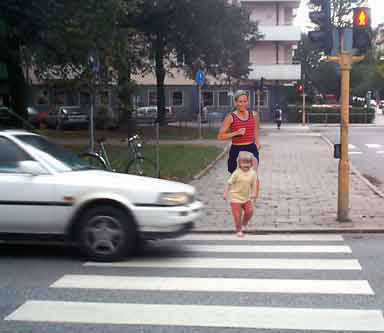Stopping
the Porn
An example of an application area, which illustrates
the problems with computers deciding what is right and wrong, is the
area of the porn-blockers, program modules meant to prevent use of the
Internet for unsuitable purposes. They are used by parents who do not
want their children to download porn on the net, by schools and libraries,
and also by employers to stop employees misusing thir office computers,
and even by countries to control the flow of information and stop undesirable
information. The People's republic of China and Singapore are examples
of countries who want to stop unaccceptable information, such as views
by so-called dissidents.
These programs, however, have severe problems. Either
they permit only access to listed and allowed sites. But since the developers
cannot keep up with all pages on the Internet, only a small subset is
listed. Alternatively, they try to guess whether a document is suitable
or not, this is done by scanning for certain character strings, like
"sex", "breast" and "xxx". This has led to horrendous mistakes, such
as prohibiting information from Middlesex (a local government in England)
or prohibiting information about breast cancer. A computer user complained
that when he downloaded code in a particular script language from the
Internet, the code was distorted in funny ways. For example, the following
piece of script code:
#define one 1 /* foo menu */
#define two 2 /* bar baz */
Was corrupted in the following way:
#define one 1 /* foo me */
# fine two 2 /* bar baz */
I leave it to the reader to compare the scripts and
conclude what "Cybersitter" had done with his script code and why.
Is
the Internet Illegal
Actually,
almost all usage of the Internet is illegal according to the privacy
protection laws in many countries. These laws prohibit all transport
of personal data from one country to another without permission from
the government. If these laws had been programmed into the computers,
then we could not have had the Internet we have today. We should be
happy that the laws are enforced by humans who understand that the intention
of privacy protection laws are not to prohibit free speech. You cannot
be sure of this. I ran one of the first Swedish BBS-es in 1978. We were
forbidden to run our BBS by the Swedish Data Inspection Directorate.
Later on, we were allowed to start it again, provided that we did not
allow anyone to write any political or religious opinions in forums
on the BBS (Since the Swedish Data Act forbade the creation of registries
of political and religious opinions, except in certain special cases,
but in contradiction to the Swedish constitution, which specifically
says that the right to communicate freely on political and religiuous
issues should be protected). We continued to use our BBS including some
discussions of political or religious issues. No one prosecuted us.
But what would have happened if the computer had been programmed to
recognize and automatically prohibit any message with political or religious
content?
The
Computer Need not Stop all Unwanted Behavior
The
idea that human rulebooks should be programmed into computers is closely
connected to another faulty idea. This other faulty idea is that anything
is legal, which the computer permits you to do. "The computer did
not stop me from accessing this data", is the standard defense
from the cracker who breaks into a computer.
If
you believe that anything allowed by the computer is legal, then obviously
you have to program the computer to prohibit all unpermitted behavior.
One can understand the danger of this by trying to envision a society
where all illegal acts are made impossible to perform. Hammers are not
allowed, since you can kill people with a hammer. Suppose you need a
hammer in woodworking. Tough luck, this is illegal, hammers are inherently
dangerous. In order to prevent crime, every movement from one place
to another without permission might be prohibited and monitored. Is
this the kind of society we want?
A
real example which I have actually seen: A building where I worked was
split into zones. Whenever you moved from one zone to another, you had
to insert a keycard into a slot to open the door. A person inserted
the keycard, opened the door, then dropped the keycard, bent to pick
it up, while the door closed with the person still in front of the door.
The door locked automatically, so the person inserted the keycard again
to open the door. This did not work. The computer obviously reasoned
as follows: "This person has already passed into the new zone.
He cannot be in front of the door. So his keycard must be falsified
or wrongly used."
Faulty
programming of the computer? Perhaps, but you can never be sure that
your program is perfect. And making the program more complex by taking
into account more special cases in deciding what the computer allows
and prohibits may introduce more bugs, while removing old bugs in the
software. The new bugs may be more insidous and difficult to find. All
problems are not best solved by making computer software more complex.
Some problems are better solved by letting humans, instead of computers,
make decisions!
Calendar
Scheduling
A good example to discuss these issues is the use of
computers to schedule meetings. This may at first seem like a good way
of using computers. But the more you look at the problem, the more you
find that real meeting scheduling includes so many special cases, where
human judgment is needed, that it becomes very difficult to get the
computer to do this automatically. For example, some meetings are more
important than other meetings, and may cause other meetings to be rescheduled,
but such a decision cannot be done by a computer. And there are contextual
factors, like knowing that you should never schedule a meeting with
a certain person on a Monday morning, which everyone knows, but which
are difficult to put into the computer.
Conclusions
- The successes of human society is based on the flexibility
of humans and their willingness to adapt their activities to different
circumstances.
- Humans are most happy and productive if they can
influence their living environment and contribute to solving problems
together.
- Laws and regulation are a form of communication between
humans. They are in reality only guidelines, people have to adapt
to varying circumstances and interpret and apply the rules with understanding
and human compassion. If everyone had to adhere 100 % to all laws
and regulations, human societies would not work any more.
- This is usually no problem when the laws and regulations
are written on paper. But if the laws and regulations are programmed
into computers, so that the computers control what is allowed and
not allowed, serious problems will often occur. In the best case,
people will only be unhappy and unproductive, in the worst case, major
catastrophs can occur.
- Computer software must be designed to allow flexibility
and human choice. Laws and regulations should be interpreted by humans,
not by machines.
- Making the software more complex, to include in it
more different special handling of special circumstances, will often
only make it worse. Instead of complex software, software should be
flexible and open-ended.
- There is a human tendency when designing software
to want to include in it "proper procedure" and "experience how things
should be done". This tendency can easily produce unusable or unsuitable
software.
- Possible exception: Certain security rules, where
enforcement is needed to overcome human weaknesses.
|





